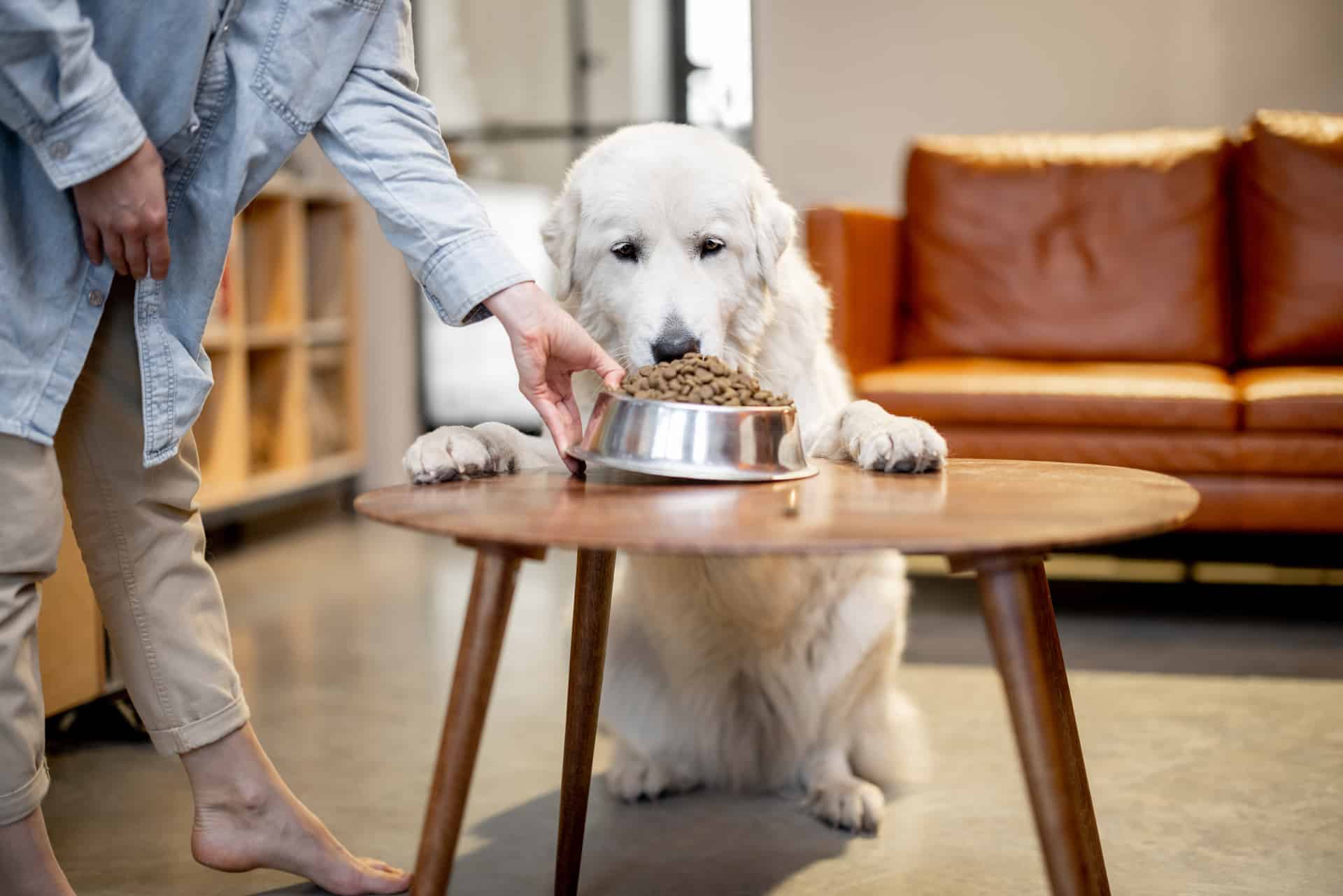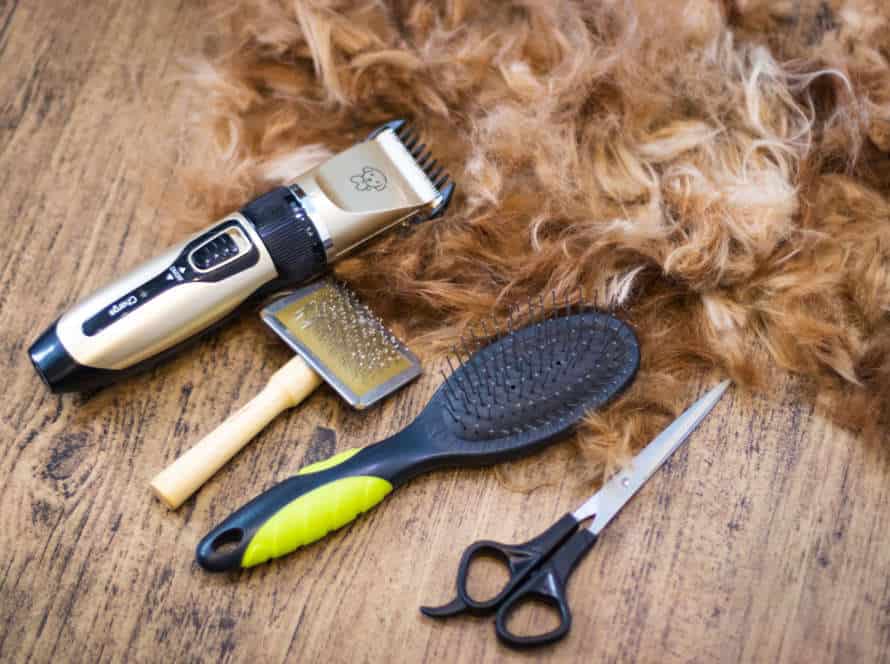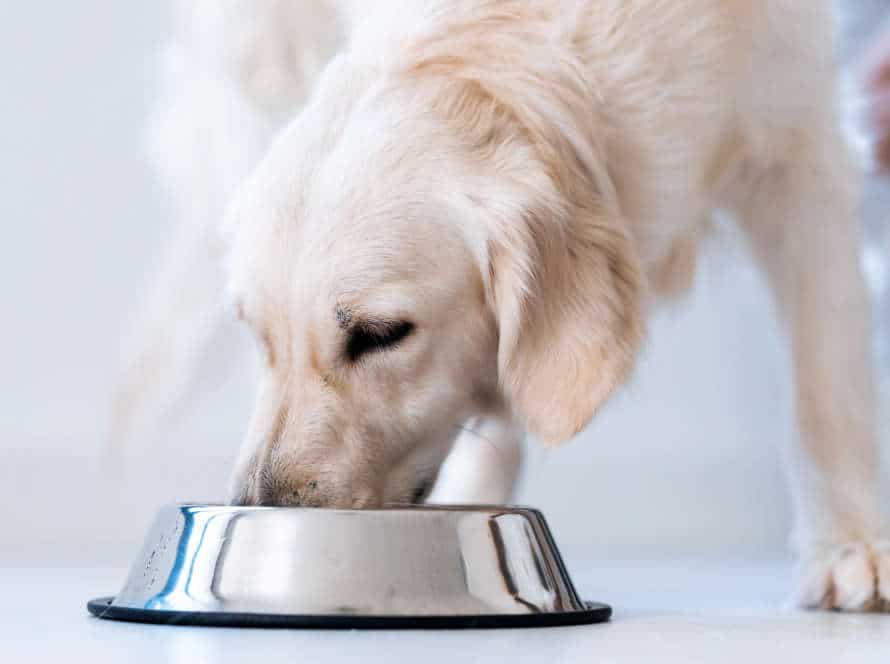The Science of Dog Nutrition: A Comprehensive Guide
Good nutrition is essential to keep your doggie happy and healthy. It’s important to understand the basics of pooch nutrition to make sure they get all the necessary nutrients.
Protein: Dogs need high-quality protein to build strong muscles and help with growth and development.
Carbohydrates: Dogs can digest and use carbs for energy, but not all carbs are the same. Whole grains, fruits, and veggies are more nutritious than processed ones.
Fats: Dogs need a certain amount of fat to keep skin and coat healthy, provide energy, and support organs.
Vitamins & Minerals: Dogs need a balance of vitamins and minerals in their diet for immune function, bone health, and wellbeing.
When selecting dog food, look for quality ingredients that meet your pup’s individual needs. Speak to your vet to determine the best diet for your pup based on breed, age, and health.
Pro tip: Always read the label and avoid dog foods with fillers and artificial preservatives.
Understanding Dog Nutrition
Pups need different nutrition than humans. Dogs can’t just eat plant-based protein. To keep them happy and active, it’s important to know their dietary requirements. This guide will cover the basics of dog nutrition, and how to keep your pup healthy.
The Essential Macronutrients – Proteins, Carbohydrates, Fiber, and Fats
Dogs need four key macronutrients for their diet: proteins, carbs, fiber, and fats. These macronutrients are essential for a dog’s health and happiness. Proteins are necessary for cell, tissue, and muscle growth. Carbs give energy to do daily activities. Fiber helps digestion and keeps the digestive system healthy. Fats help absorb vitamins and minerals, and also provide energy.
The right amounts of these macronutrients vary with a dog’s age, activity level, and breed. A balanced diet with quality proteins, complex carbs, and healthy fats is a must for a dog’s wellbeing and life span. Pro tip: Ask a vet what the best macronutrient ratios are for your pup.
The Role of Vitamins and Minerals in Dog Nutrition
Dogs need a balanced diet, with essential vitamins and minerals, to stay healthy and fight off disease.
Vitamin A is vital for vision, immune system and skin health.
Vitamin D is necessary for strong bones and teeth, and helps the body absorb calcium.
Vitamin E is an antioxidant that guards against cellular damage and aids in immune system function.
Calcium helps with strong bones and teeth, plus muscle and nerve function, and blood clotting.
Iron helps make hemoglobin, which transports oxygen in the blood.
A dog’s nutritional needs can vary based on age, activity and medical conditions. Check with a vet to determine the best diet plan, with a variety of foods that suit your pup.
Identifying Nutritional Requirements Based on Dog Size, Breed, and Age
Make sure your furry companion stays healthy and strong! Identify their dietary needs depending on their size, breed and age. Dog nutrition depends on various things such as age, weight, breed, activity level and health. For example, a small breed may need more calories per pound than a larger one. Give them a healthy, balanced diet with all the necessary nutrients.
Young pups need high protein diets. Older dogs may need diets low in protein for easier digestion. If your dog has any health issues, like diabetes, kidney problems or allergies, they may need a special diet.
Speak to your vet to figure out what’s right for your pup. Always keep track of their body weight, energy levels and health. Pro-tip: pick a high-quality dog food brand with essential vitamins and minerals. Keep your pet happy and healthy!
Choosing the Right Dog Diet
Selecting the right diet for your puppy is key for their health and happiness. Nourishment has a major role in a dog’s physical, mental, and emotional growth. Figuring out which food is great for your pup can be tricky. To help, we’ve made this guide to canine nutrition. We have a look at the various kinds of dog food, the basic nutrients dogs require, and the possible health risks of inadequate nutrition.
Comparing Commercial Dog Foods – Dry, Wet and Semi-moist
There’re 3 kinds of commercial dog food: dry, wet, and semi-moist. Each have their own pros and cons.
- Dry dog food is the most common and cost-effective. It has a long shelf-life and helps clean the pup’s teeth, but it has lower moisture content.
- Wet dog food is more appetizing than dry food and has a higher moisture content. Though, it’s pricier and has a shorter shelf-life.
- Semi-moist dog food is a mix of both dry and wet food. It’s chewy and has slightly more moisture content. It’s pricier than dry food but cheaper than wet food, and easier to serve.
When selecting the right type of food for your pet, factor in their age, breed, activity level and medical history. Consult a vet to find the best diet that meets your pup’s nutritional needs.
Understanding Raw Food Diet – Pros and Cons
A raw food diet for dogs is when you feed them uncooked and barely processed meats, veggies and fruits. This diet has its advantages and disadvantages. It’s essential to choose the best diet for your pup dependent on their nutrition needs.
Pros of a raw food diet:
- Better digestion: Raw food is easier to digest. Dogs on this diet may have less bloating, constipation or diarrhea.
- Shinier coat and better skin: Raw food holds lots of essential nutrients which can improve the look of your dog’s coat and skin.
- Boosted energy levels: Raw food has more nutrients, so it will give your pup more energy.
Cons of a raw food diet:
- Higher risk of bacteria: Raw food could contain hazardous bacteria such as salmonella or E.coli, which can cause sickness in both dogs and humans.
- Nutritional imbalance: A raw food diet may be missing certain essential nutrients that your pup needs.
- Price: Feeding your dog a raw food diet could be more expensive than regular dog food.
Doing some proper research and consulting a vet can help you choose the right diet that meets your pup’s nutrition needs.
Homemade Dog Food – Finding the Right Recipe
Making homemade dog food is a great way to make sure your pup is eating balanced and nutritious meals. But it can be tricky to find the right recipe. Here are some tips on selecting the perfect diet for your pup:
- Consult your vet. They can help you figure out what your dog needs nutritionally, and suggest ingredients and nutrient ratios that work for their age, breed, and health.
- Check the recipe. A good dog food recipe should mix protein, healthy fats, and carbs. Plus, it should contain vitamins and minerals like calcium, phosphorus, and potassium. Avoid recipes that rely too heavily on one ingredient or nutrient, as this can lead to deficiencies.
- Experiment! Dogs have individual tastes, so don’t be afraid to try different recipes to find one your pup likes and that meets their nutritional needs.
By following these steps, you can create a homemade dog food recipe that’s yummy and healthy for your furry friend!
Feeding your Dog
Nutrition is a must for a healthy pup! But, choosing the right food for your dog can be tricky. Let this article help you! It will provide a summary of dog nutrition and guide you to pick the perfect food for your furry companion!
Feeding Schedules – The Dos and Don’ts
It’s key to set up a regular feeding schedule for your pup to make sure they get the proper nutrition and stay healthy. Here are some do’s and don’ts to follow when feeding your four-legged friend:
- Do pick quality dog food that fits your pup’s nutritional needs based on size, age, and activity level.
- Do create a consistent feeding plan and avoid free-feeding to stop over-eating, weight gain, and other health issues.
- Do check your dog’s weight and adjust the amount of food accordingly.
- Don’t give table scraps or human foods that can be harmful, like chocolate, onions, garlic, and particular fruits and veg.
- Don’t make any abrupt changes to your pup’s diet or feeding routine, as it can lead to digestive issues and other health problems.
Remember, your pup’s nutritional needs can differ depending on numerous factors, such as their breed, age, and health condition. Ask your vet for personalized advice on your dog’s feeding schedule and diet.
Understanding Dog Treats – Finding Healthy Options
Dog treats are a great way to show your furry friend love and reward them for good behavior. But it’s important to know what makes a healthy treat. Here are some tips:
- Check the ingredients list. Avoid added sugar, artificial colors, flavors, and preservatives. Look for whole food ingredients.
- Quality over quantity. Don’t overfeed. Too many treats can cause digestive issues and obesity in dogs.
- Choose age-appropriate treats. Puppies, adult dogs, and senior dogs have different nutritional needs.
- Think about dietary restrictions. If your pup has a food allergy or intolerance, look for treats without the triggering ingredients.
- Pro tip: Make your own healthy treats at home using peanut butter, pumpkin puree, and oats. It’s cost-effective and fun!
The Human Food Debate – What’s Safe and What’s Not
What human foods are safe for dogs and which ones are not is a tricky debate. While some human foods are okay, others can be dangerous and harm your pup. It’s important to learn about dog nutrition to make sure your four-legged friend is getting all the nutrients they need.
Here are the key points:
- Safe Human Foods: Proteins such as chicken, beef and turkey. Plus, vegetables like carrots, green beans and peas. And fruits like apples, bananas and blueberries are all fine.
- Dangerous Human Foods: Chocolate, grapes, onions, garlic, avocado and artificial sweeteners are toxic and should be avoided.
- Essential Nutrients: Proteins, fats, vitamins and minerals. A diet that covers these will keep your pet healthy and happy, and help them live longer.
Health Issues and Preventive Care
Feeding your doggo a nutritious diet is key to their health. It should include all needed vitamins, minerals, fats and proteins. Besides that, preventive care is needed for optimal condition. Such as dental care, vaccinations, and parasite prevention. Here’s how to keep your pup healthy!
Common Nutritional Health Problems in Dogs
As a responsible pup parent, it’s vital to recognize and forestall common dietary health issues in your furry friends. Here are some of the most frequent dietary health problems dogs face, plus prevention tips:
Obesity
Becoming a major problem in dogs, obesity can lead to other health problems, like diabetes and joint issues. To stop obesity, give a balanced and healthy diet, no table scraps, and stick to recommended serving sizes.
Food allergies
Just like humans, dogs can experience allergies to certain types of food. This can cause itchy skin or digestive issues. To identify food allergies, observe your dog’s symptoms and visit the vet for testing. To prevent allergies, have a diverse and balanced diet, and keep human food and processed snacks away from your pet.
Dental problems
Poor dental hygiene in dogs can lead to bad breath, gum inflammation, and tooth loss. To prevent this, brush your dog’s teeth regularly, feed hard and crunchy foods to promote strong teeth, and avoid sugary or sticky snacks.
Pro tip: To ensure a healthy and long life for your dog, keep up with regular check-ups, offer a balanced diet, and make sure they get plenty of exercise. These are key to preventing and treating common dietary health problems in dogs.
Selecting Dog Foods for Health Conditions
When selecting food for your pup, health should be top priority. Good nutrition can help keep your furry companion fit and healthy, as well as manage existing conditions. Here’s how to choose the right food:
- Research your pup’s breed, size, age and any health issues.
- Look at the ingredients list to make sure it meets your pup’s needs.
- It should contain protein and amino acids to support muscles and organs.
- Avoid synthetic colors, flavors and preservatives as they can cause allergies and health issues.
- Consult your vet before introducing a new food.
By following these tips, you can create a tailored meal plan that provides essential nutrients, keeping your pup happy and healthy.
Supplements and Vitamins for a Healthy Dog
Supplements and Vitamins can be very beneficial for your pup’s health. The proper dosages and administration can help prevent diseases and improve immune function. Here are some of the supplements and vitamins for your four-legged buddy:
- Fish Oil – This supplement reduces inflammation and provides Omega 3 and 6 fatty acids, resulting in a shiny coat and healthy skin for your pup.
- Glucosamine and Chondroitin – Supplements with these components can help with joint health. It helps keep mobility, reduce joint discomfort and promotes recovery in dogs with arthritis.
- Probiotics – Probiotics give your pup a healthy gut, meaning they will digest and absorb nutrients better and be safe from gastrointestinal issues.
- Vitamin E – This antioxidant boosts the immune system and helps maintain healthy skin and coat.
- Magnesium – Magnesium supplements can help ease anxiety and chronic pain, also maintaining good heart health for your dog.
Remember to consult your vet for the best way to use supplements and vitamins for your pup’s safety.
Dog Nutrition Myths and Misconceptions
Dog nutrition is packed with myths and misconceptions. Many owners are unaware of their pup’s specific needs, which can cause poor nutrition and health issues. Here, we’ll unravel the myths and misconceptions about dog nutrition so you can decide what’s best for your furry pal.
Grain-free Diets and their Risks
Grain-free diets for dogs have gained traction recently; however, pet owners need to be aware of the potential risks and drawbacks.
Although certain dogs may gain advantages from grain-free diets, there is no scientific proof that grains are bad for dogs.
Risks linked to grain-free diets include:
- Nutritional imbalances due to the absence of grains and other essential nutrients.
- Enhanced risk of heart disease, especially in breeds genetically predisposed to it.
- Elevated costs vis-a-vis traditional dog food.
Before introducing any changes to a pet’s feeding routine, like a grain-free diet, it’s best to consult with a vet. To guarantee your pet’s diet is nutritionally balanced and suitable for their dietary needs, read labels on their food carefully.
Pro Tip – Check the labels!
Raw Food Diets and their Health Claims
Raw food diets for dogs have become popular recently. Pet owners claim health benefits from it. But, it’s important to look into this trend carefully.
The diet mainly consists of raw meat, bones, fruits and vegetables. People think it’s more natural and nutritious. But, there’s no scientific evidence to back it up.
Raw food diets don’t work for every dog. Each one has their own dietary needs. Consulting a vet before changing the diet is important. It prevents nutritional deficiencies that could be harmful.
In conclusion, there is no one “best” diet for every dog. It’s best to make decisions based on their needs and health, not trends or hearsay.
Other Popular Nutrition Myths – Separating Fact from Fiction
There are several myths about dog feeding still around. It’s important to know the facts in order to give our furry friends a balanced diet.
Here are some common myths:
- Myth 1: Grain-free diets are best for dogs. Fact: Grains can be beneficial for dogs, providing vital nutrients and fiber.
- Myth 2: Raw food diets are safer. Fact: Raw food can be dangerous with bacterial contamination and may not have all the nutrients needed.
- Myth 3: High-protein diets are best. Fact: Dogs need protein, but too much may be harmful, particularly for those with kidney or liver problems.
Checking the facts is key to making sure our canine companions stay healthy and nourished.
Frequently Asked Questions
Q: What is the best type of food to feed my dog?
A: The best type of food to feed your dog depends on their individual nutritional needs. Consult with your veterinarian to determine which type of food is best for your specific dog.
Q: How much should I feed my dog?
A: The amount of food you should feed your dog depends on their weight, activity level, and overall health. Follow the recommended feeding guidelines on the food packaging, or consult with your veterinarian for guidance.
Q: Can I feed my dog human food?
A: While some human foods are safe for dogs to consume in small quantities, it is not recommended as a regular feeding practice. Many human foods contain ingredients that can be harmful to dogs, and feeding table scraps can lead to weight gain and other health issues. Stick to feeding your dog a balanced dog food diet.
Q: How often should I feed my dog?
A: Generally, adult dogs should be fed once or twice a day. Puppies may require more frequent feedings per day to accommodate their growing bodies. Consult with your veterinarian for specific feeding recommendations for your dog.
Q: Can I give my dog supplements to improve their nutrition?
A: It is generally not recommended to give your dog supplements without consulting with your veterinarian first. While some dogs may benefit from certain supplements, like joint health supplements or probiotics, over-supplementing can be harmful to your dog’s health.
Q: What should I do if my dog has a food allergy or intolerance?
A: If you suspect that your dog has a food allergy or intolerance, consult with your veterinarian for guidance. They may recommend an elimination diet or prescribe a specialized dog food that is designed to meet your dog’s specific nutritional needs.







